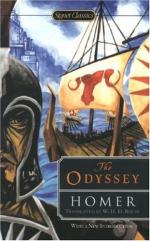In seeing the works through the press I have had the invaluable assistance of Mr. A. T. Bartholomew of the University Library, Cambridge, and of Mr. Donald S. Robertson, Fellow of Trinity College, Cambridge. To both these friends I give my most cordial thanks for the care and skill exercised by them. Mr. Robertson has found time for the labour of checking and correcting all the quotations from and references to the “Iliad” and “Odyssey,” and I believe that it could not have been better performed. It was, I know, a pleasure for him; and it would have been a pleasure also for Butler if he could have known that his work was being shepherded by the son of his old friend, Mr. H. R. Robertson, who more than half a century ago was a fellow-student with him at Cary’s School of Art in Streatham Street, Bloomsbury.
Henry FESTING Jones. 120 Maida Vale, W.9. 4th December, 1921.
The Odyssey
Book I
The gods in council—MIVERVA’S visit to Ithaca—the challenge from telemachus to the suitors.
Tell me, O Muse, of that ingenious hero who travelled far and wide after he had sacked the famous town of Troy. Many cities did he visit, and many were the nations with whose manners and customs he was acquainted; moreover he suffered much by sea while trying to save his own life and bring his men safely home; but do what he might he could not save his men, for they perished through their own sheer folly in eating the cattle of the Sun-god Hyperion; so the god prevented them from ever reaching home. Tell me, too, about all these things, oh daughter of Jove, from whatsoever source you may know them.
So now all who escaped death in battle or by shipwreck had got safely home except Ulysses, and he, though he was longing to return to his wife and country, was detained by the goddess Calypso, who had got him into a large cave and wanted to marry him. But as years went by, there came a time when the gods settled that he should go back to Ithaca; even then, however, when he was among his own people, his troubles were not yet over; nevertheless all the gods had now begun to pity him except Neptune, who still persecuted him without ceasing and would not let him get home.
Now Neptune had gone off to the Ethiopians, who are at the world’s end, and lie in two halves, the one looking West and the other East. {1} He had gone there to accept a hecatomb of sheep and oxen, and was enjoying himself at his festival; but the other gods met in the house of Olympian Jove, and the sire of gods and men spoke first. At that moment he was thinking of Aegisthus, who had been killed by Agamemnon’s son Orestes; so he said to the other gods:
“See now, how men lay blame upon us gods for what is after all nothing but their own folly. Look at Aegisthus; he must needs make love to Agamemnon’s wife unrighteously and then kill Agamemnon, though he knew it would be the death of him; for I sent Mercury to warn him not to do either of these things, inasmuch as Orestes would be sure to take his revenge when he grew up and wanted to return home. Mercury told him this in all good will but he would not listen, and now he has paid for everything in full.”




